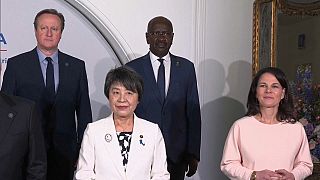South Africa
Africa’s elephant population has fallen by around 20 percent between 2006 and 2015, owing to a surge in ivory poaching,according to the International Union for Conservation of Nature (IUCN).
“Organized criminal gangs operate large scale in Africa, passing ivory illegally to Asia, which is driving this massive poaching causing the decline in the population of elephants,” says Ginette Hemley, a member of the World Wildlife Fund (WWF).
In it’s African Elephant Status Report released at a wildlife trade conference in Johannesburg South Africa, the conservation group said that this is the worst drop in elephant numbers in 25 years.
Based on 275 estimates from across the continent, the report put Africa’s total elephant population at around 415,000, a decline of around 111,000 over the past decade.
Thousands of conservationists and government officials are in Johannesburg for the 12-day conservation gathering, seeking to hammer out new international trade regulations, to protect a vast array of wildlife species.
Losses in some countries have been staggering. Tanzania, which relies heavily on wildlife tourism, saw a 60 percent decline in its elephant population.
“The surge in poaching for ivory that began approximately a decade ago – the worst that Africa has experienced since the 1970s and 1980s – has been the main driver of the decline,” the IUCN said.
Elephant poaching has risen to meet red-hot demand among fast-growing consumer markets in Asian economies such as China’s, where ivory is a coveted commodity used in carving and ornamental accessories.
The IUCN noted that southern populations in “Namibia, South Africa and Zimbabwe are stable or increasing, and there is evidence of elephant range expansion in Botswana.”
But poachers are also training their guns on southern Africa with big declines noted in Mozambique, it said.
Namibia and Zimbabwe have submitted proposals to the U.N.‘s Convention on International Trade in Endangered Species (CITES), which is meeting in Johannesburg, seeking permission to lift a global ban on the ivory trade so they can sell stockpiles.
This is opposed by other African nations such as Kenya which fear that illicit ivory can be laundered with clean supplies and that it could stimulate demand for a commodity which has one main source – a dead elephant.













00:51
Why is Botswana threatening to send herdes of elephants to Germany?
00:49
Ivory Coast president rewards football team for their AFCON win
02:10
Rwanda's mountain gorillas: A conservation success Story
01:24
Drought kills exhausted elephants in Zimbabwe
00:51
At least 100 elephants dead from drought in Zimbabwe
02:10
Black rhinos thrive in Kenyan sanctuary